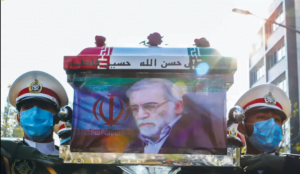
Iranian officials and regime supporters responded to the killing of Dr. Mohsen Fakhrizadeh, widely regarded as the “father” of Iran’s military nuclear program, with a public outpouring of fury. Fakhrizadeh
Many of the responses sought to achieve the difficult rhetorical task of belittling the achievement of Iran’s enemies, while at the same time stressing the magnitude of the loss. All promised vengeance.
Esmail Ghani, commander of the Quds Force of the Islamic Revolutionary Guards Corps, declared that “The enemy is not manly enough to fight a battle with Iran directly.
The demise of Israel is near and these are the last tantrums of Israel. Revenge for Fakhrizadeh’s blood is coming, and it will be with the solidarity of the Iranian forces with all their formations.” (All translations by the Middle East Center for Reporting and Analysis.)
Tasnim, a news website associated with the IRGC, asserted that “If you want to stop the rabid dog, you have to confront him, or he will attack you again.
Missiles, as Iran’s main response option, can hit any part of Israel from the depths of the country… In addition to the missile option, the Islamic Republic has other opportunities ahead of it, including Iran’s presence near the borders of the occupied territories in Syria.
In Lebanon, too, Hezbollah is at its best as a powerful arm of the Islamic Republic.”
Hossein Salami, commander-in-chief of the Islamic Revolutionary Guards Corps, said, meanwhile, that “revenge and severe punishment” for the perpetrators of the assassination “are on the agenda.”
The Iranian intention to seek retribution is clear. But what form is Iran’s response likely to take?
Tehran possesses an extensive infrastructure of paramilitary client organizations across the Middle East, one or another of which might be activated to strike at Israel.
Read the complete article at NewsNow.com
Also Read: Shia shrines are Iran’s gates for influence in Iraq

